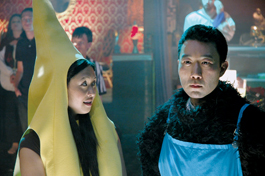home | metro silicon valley index | movies | current reviews | film review

CASUAL FRIDAY: Hiroshi Watanabe and Joy Osmanski get dressed up in 'White on Rice,' opening Friday.
Velcro Shoes
'White on Rice': An order of 'Napoleon Dynamite' with soy sauce
By Richard von Busack
INDIE FILMMAKER Dave Boyle has an interesting history. He was an animator for a time. He spent two years in Australia on a Mormon sojourn, trying to convince the locals to give up beer for Jesus. Down under, he picked up enough Japanese to finish learning the language at Brigham Young University. White on Rice, his Japanese-with-English-subtitles made-in-Utah comedy, is perhaps a nod to the Tora-San series, the popular Japanese opus about the lovelorn and hapless uncle who can never find a place for himself. (The immensely popular comedies gave the deeply rooted Japanese a sense of what it would be like to wander. Then the bittersweet endings reminded them of the importance of home. No wonder they put up a statue of Tora-San.) But Tora-San's matchmaking and hard work are outside the purview of indefatigable 30ish lay-about Hajimi, known as Jimmy (Hiroshi Watanabe).
A harmless but limpetlike wonk in Velcro shoes, he's either allergic or immune to work. He has one accomplishment and has been doing his best to live off it: he had a gory seppuku scene in the samurai movie Ambush at Blood Trail Gate. Back in Japan, Jimmy's wife made three months' worth of dinners, put them in the refrigerator and then left him for good. Now, in America, he lives off his faithful sister, Aiko (Nae), and his unsmiling brother-in-law, Tak (Mio Tadaki), sharing a room with his bespectacled nephew Bob (Justin Kwong). Jimmy is certain he's destined for love, and when a distant relative Ramona (Lynn Chen) shows up, he turns stalker: capturing and reading her diary and wheedling dates out of her.
White on Rice doesn't have much of a point or much of a shape, even if the gory hara-kiri scene at the beginning matches an unfortunate bloody accident at the end; the movie dissolves into a puddle of its own anecdotes. In this league of film, you can count on a fresh location (Salt Lake City, a place where you never know what year it is) and of course the gutsy acting of the locals, with Pepe Serna as a histrionic geology professor who recognizes that Jimmy isn't bone lazy, he just needs guidance. And it's bawdy in parts: one scene takes place in an adult boutique. Old Tak's bed is dead, and he's trying to stimulate his slumber-prone younger wife, Aiko, with a present of see-through lingerie.
As a white outsider, Boyle deserves some credit for trying to deal with the wrongheaded idea that Japan as a humorless culture. Is it possible, though, he just used Japanese characters to tell a story about his own friends and neighbors? The race-change sticks out like a gratuitous gesture. The other problem is that even if White on Rice must have been sold as Napoleon Dynamite with soy sauce, it's never really that funny. Yes, it has the courage of black-comic convictions—such as a scene of a little boy playing piano, oblivious to the fact that his father's blood is on his face. And it has some good barbs: "It's like having a dead guy around," Tak snorts about his loafer brother-in-law. Boyle's problem is that it's not as easy as it looks to have a nigh-passive lead character in a film. The Big Lebowski is the exception that proves the rule. Worst, this movie is redundant programming anywhere Still Walking is still playing.
![]() WHITE ON RICE (PG-13; 83 min.), directed by Dave Boyle, written by Boyleand Joel Clark, photographed by Bill Otto and starring Hiroshi Watanabe, opens Sept. 18 at Camera 3 in San Jose.
WHITE ON RICE (PG-13; 83 min.), directed by Dave Boyle, written by Boyleand Joel Clark, photographed by Bill Otto and starring Hiroshi Watanabe, opens Sept. 18 at Camera 3 in San Jose.
Send a letter to the editor about this story.
|
|
|
|
|
|